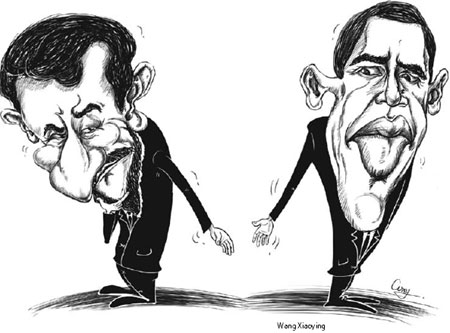By Liu Qiang
Mahmoud Ahmadinejad began his second term as Iranian president last Wednesday, nearly two months after winning a disputed election. Iran has generally maintained political stability over the past four years, but Ahmadinejad now faces a series of new difficulties and challenges.

The ruling conservative party didn't face much of a challenge from reformists since they lost the presidential post and the parliament four years ago. But this year's election has greatly raised the reformists' confidence of winning back the presidency. Mirhossein Mousavi's high-pitched campaign in the election and the number of his supporters during the protests against the election results are pointers to their rising confidence.
The series of protests against the election results have consolidated the reformists, and even Akbar Hashemi Rafsanjani, former president and a moderate, supports their stance. As the mass trial of some opposition forces goes on, new protests are expected to erupt, heightening the political battle between the reformists and conservatives.
Ahmadinejad, it seems, has to devote more time to domestic politics during his second term because apart from the reformists, he also has to tackle his rivals who have emerged in the conservative group. What will make matters really difficult for the president is Ayatollah Ali Khamenei's half-hearted support because of his disagreement with the Ahmadinejad's Cabinet composition.
The president faces a number of tricky economic problems, from high unemployment to high inflation. Iran's official data show the country now has 2.7 million unemployed and its inflation rate grew by 22.5 percent in a year from March 2008. To top it all, the global economic crisis is likely to cause a drop of $38.7 billion in Iran's export volume this year - the expected $56.3 billion worth of exports would be the lowest since 2004.
So checking the high unemployment and inflation rates will be the top priority of the Ahmadinejad government.
The other great challenge for the government is finding a way to extricate Iran from the diplomatic row caused by its controversial nuclear program. The nuclear issue has long been a source of tension between Iran and the West. The long-strained Iranian-US ties have improved to some extent after Barack Obama assumed the office of the US president. But Obama's moderate diplomatic policy and the global economic crisis, which forced the US administration's attention toward domestic problems, are more responsible for that.
Nonetheless, as the world's largest economy bottoms out, the Obama administration will divert its attention to Iran's nuclear program once again, increasing the pressure on Teheran.
Despite the pressing domestic and foreign challenges, the new Iranian government is not expected to drastically change its hardline policies, as was indicated by Ahmadinejad in his inauguration speech last Wednesday. He said Iran would continue with its active and strong diplomatic stance and refrain from maintaining silence against illegal acts, foreign intervention, warmongers and the unfair treatment of his country. "We do need to build friendly relations with the outside world on a peaceful, fair and equal basis, but we will by no means tolerate any insult," the outspoken president said.
Iran's long established conservative domestic policy is not expected to see much change either, though Ahmadinejad said in his inaugural speech that the new government will effect sweeping reforms in various fields. Given his record during the first term, it seems unlikely that Iran's controversial nuclear program will see a peaceful solution.
It is not known whether Teheran will be encouraged to follow Pyongyang's example, though the international community's attitude and determination to settle Iran's nuclear issue peacefully will directly influence that decision.
Teheran's ties with Washington, too, are likely to remain uncertain during Ahmadinejad's second term. Obama's reaffirmation that the US would like to improve its ties with Iran through dialogue has not changed Teheran's stance that Washington's policies toward it are prejudiced. This shows an improvement in US-Iranian ties depends more on the length Washington is ready to go to engage Teheran in a dialogue.
The US and its allies are discussing the possibility of imposing the most severe economic sanctions on Iran, including cutting off exports of petroleum and other refined oil products to Teheran if Ahmadinejad fails to respond positively to US offers on the nuclear issue. If the US and its allies impose the sanctions, it would prove catastrophic for Iran. The sanctions will foil any efforts to improve US-Iranian ties, too. Hence, the onus for better US-Iranian ties lies more with Washington.
The author is director of the Institute of International Relations under the Jiangsu Provincial Academy of Social Sciences.
(China Daily August 13, 2009)